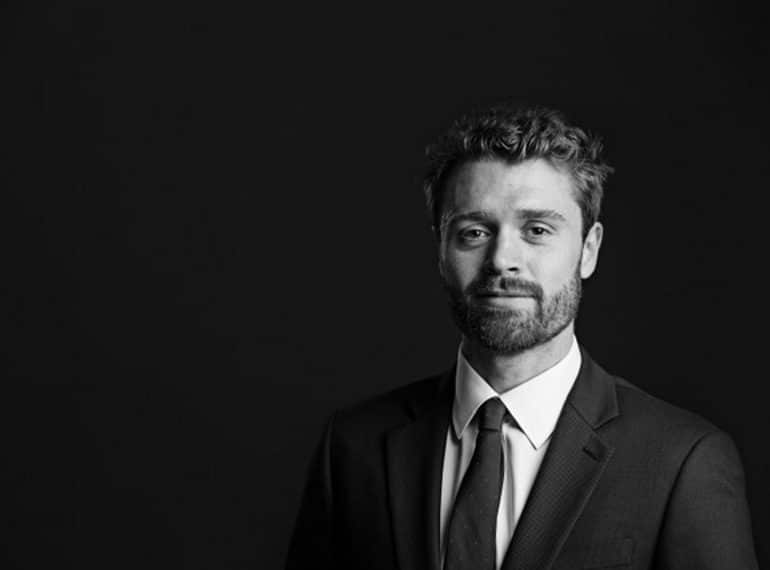
After starting his professional life at one of London’s élite Magic Circle legal firms, Oliver Harland has since single-mindedly forged a career that combines Law at the highest level with his passion for sport.
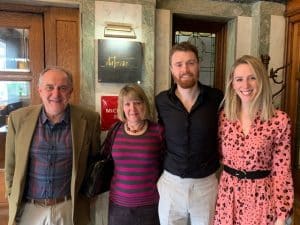 While he relished the occasional opportunities he had to work on sports cases during his years at Freshfields Bruckhaus Deringer and even embarked on a somewhat gruelling distance-learning Master’s degree in Sports Law in his spare time to pursue his interest, it was not enough.
While he relished the occasional opportunities he had to work on sports cases during his years at Freshfields Bruckhaus Deringer and even embarked on a somewhat gruelling distance-learning Master’s degree in Sports Law in his spare time to pursue his interest, it was not enough.
He had, he says, “a burning desire to be involved in professional sport – even if I finally accepted that I would never run out at Twickenham wearing the famous red rose”.
So, when the opportunity arose in 2017 to work at Northridge, a newly established firm specialising in complex sport and entertainment cases, Ollie (OE 1999-2005) jumped at the chance.
The risk has paid off. Not only has Northridge quickly become the largest sport-specific law firm in Europe and one of only two firms top-ranked for Sports Law in the most important UK legal directories (Legal 500 and Chambers & Partners), but Ollie has also thrived there and has recently been promoted to Managing Associate.
“My ambition over the next few years is to continue helping the firm to grow and to solidify its position as the firm the sports sector turns to when the stakes are highest,” he says.
He traces his love for sport back to his schooldays. “Rugby played a huge part in my upbringing. I played on Saturdays for QE and on Sundays for Saracens Amateur RFC. Many of my fondest QE memories are those from the rugby pitch, especially from my final year. Our First XV that year was not the most talented team that the School had produced – a few of us played for Hertfordshire county, but none were age-group internationals. However, we had an incredibly strong bond and played with a never-say-die attitude. That year we beat all our biggest rivals and avenged a number of painful defeats from previous years. The most satisfying was a 32-0 win against Haberdashers on their own pitch. After each game we would blast out The White Stripes’ Seven Nation Army in the changing room, long before it became an anthem in professional sports grounds across the country.
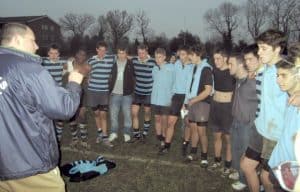 “I feel immensely proud of what the rugby squad achieved that year both on and off the pitch. Much credit goes to Mr [Tim] Bennett for getting us to invest in the philosophy that, as a whole we were much greater than the sum of our parts – which I think applies to most things in life.” [Mr Bennett is pictured giving a final speech to the First and Second XV after Ollie’s last game – a victory against Berkhamsted. The second picture, below, shows the 2004-2005 First XV].
“I feel immensely proud of what the rugby squad achieved that year both on and off the pitch. Much credit goes to Mr [Tim] Bennett for getting us to invest in the philosophy that, as a whole we were much greater than the sum of our parts – which I think applies to most things in life.” [Mr Bennett is pictured giving a final speech to the First and Second XV after Ollie’s last game – a victory against Berkhamsted. The second picture, below, shows the 2004-2005 First XV].
Inter-House rugby, together with cricket, also formed some significant memories for Ollie, who was Underne House Captain. “We were always a competitive house, particularly in sport. We had some epic, and often quite heated, battles with Stapylton. I still feel robbed after one match where James Tookman’s conversion was (erroneously) ruled to have missed the posts, which cost us the inter-house rugby competition!
“I no longer play rugby, but remain a fan. It has been difficult for me to watch the unfolding of the Saracens salary-cap scandal.” (His colleagues at Northridge acted for Premier Rugby Limited in its dispute with the club.)
He arrived at QE the year before Headmaster Eamonn Harris retired. “My overriding memory of [him] was his address at my first Headmaster’s assembly. He told us that, whilst we might have passed an entrance exam to get into the School, we had not yet earned the right to call ourselves ‘QE Boys’. He made clear the standards of behaviour that were expected of us (including the length of our tie) and that to succeed at the School, and in life, we would need to be hard-working and dedicated. It was equal parts inspirational and fear-inducing; it was what I needed to be told.”
Equally, Ollie clearly remembers current Headmaster Neil Enright joining the School. “He and Miss Flook (now Mrs Anne MacDonald) were my A-level Geography teachers. It was clear early on that Mr Enright would end up as Headmaster. He was incredibly enthusiastic about the subject, and about his students challenging themselves to learn more than just the syllabus. I hope they have both forgiven me for not studying Geography at university.”
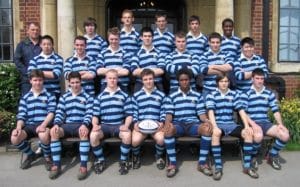 After QE, he went to the University of East Anglia (UEA) to read Law with American Legal Studies – a four-year course, of which he spent the third year as an International Visiting Scholar on the Juris Doctor programme at the Brandeis Law School, University of Louisville, Kentucky, studying US Constitutional Law and trial practice (amongst other subjects).
After QE, he went to the University of East Anglia (UEA) to read Law with American Legal Studies – a four-year course, of which he spent the third year as an International Visiting Scholar on the Juris Doctor programme at the Brandeis Law School, University of Louisville, Kentucky, studying US Constitutional Law and trial practice (amongst other subjects).
Characteristically, he also became a fan of US collegiate sport – “Louisville has one of the best college basketball teams in the country” – and enjoyed the opportunity to attend the famous Kentucky Derby in 2008.
In 2009-10, he completed the Legal Practitioners Course (LPC) at BPP University and then, after working at a call centre, went travelling in Central and South America.
In 2011, he started at Freshfields. “I initially thought I would become a transactional lawyer; I liked the idea of being a ‘dealmaker’, without really knowing what that would entail – ‘all-nighters’ and reading through endless contracts. I quickly found that I preferred, and had greater aptitude for, litigation and dispute resolution. I enjoy the fact that, no matter who the client or what the subject matter, every case involves a human story that needs to be told.
“The highlight of my training contract was a six-month secondment to the firm’s office in New York City. I was put up in a studio apartment a few blocks away from Central Park and my office was based on the 58th floor of the Citibank Center, with spectacular views of the Chrysler Building and downtown Manhattan. I loved everything about New York City and its work hard, play hard culture. I was there during Hurricane Sandy, which made the office building sway. My apartment was only a few blocks away from a high-rise building crane that was left twisted by the wind and dangling precariously over the sidewalk below.”
Sport again played a big part in his experience. “I went to watch the New York Knicks at Madison Square Garden and the New York Yankees at Yankee Stadium. I was also lucky enough to play ‘flag-football’ (a non-contact version of American football) and throw a touchdown pass in a charity event at the MetLife Stadium, which is home to both the New York Giants and Jets.”
In 2013, he qualified into the Financial Institutions Disputes Group (FIDG) in Freshfields’ London office. “Over the next three years I worked on a number of large and complex commercial disputes in the English High Court and two of the largest-ever regulatory investigations into the global financial services sector. These were the LIBOR and forex scandals, which centred around allegations that employees at major international banks and brokerages had colluded in the setting of inter-bank interest rates and foreign exchange rates.
“During that time, I also spent nine months on client secondment to Deutsche Bank to assist its in-house legal team respond to regulatory enquiries. I believe that client secondments are a valuable experience for any private practice solicitor, as they help to better understand a client’s business and its methods of operation.
“My time at Freshfields was excellent training. Like my time at QE, I worked with some incredibly bright and hard-working people, and the firm set very high standards. I carry those standards with me and will do so for the rest of my career.
“I worked on a couple of interesting sports matters at Freshfields, including a piece of advice on whether the FIFA World Cup could be moved from summer to winter and a review of compliance systems and control at the IAAF (now World Athletics) following allegations of corruption involving former IAAF executive officers. Those matters piqued my interest in becoming a sports lawyer on a permanent basis. Although Freshfields did some sports work, it was not a key practice area and so I began to look for practical ways to re-focus my career.”
First, in 2015, Ollie began the distance-learning Master’s (LLM) in Sports Law from De Montfort University. Continuing to work full-time, he studied during evenings and weekends.
“I recently completed the final stage, which was a 15,000-word dissertation on… match-fixing and other manipulative behaviours connected to sports betting, [looking at] whether sports’ governing bodies can effectively self-regulate against those behaviours. I hope to have some of that work published but, in short, my view is that match-fixing needs to be more widely understood as a form of financial services fraud that facilitates organised crime. It has a deep impact on society and should not be dismissed as merely a sporting issue.”
Second, in 2016, he left Freshfields and joined the sports litigation team at Charles Russell Speechlys (CRS). He had, in fact, done his work experience with CRS while at QE, spending a week working in the property litigation team. “That contact helped when making the transition from Freshfields to CRS, as I had kept in touch over the years – showing the potential value of early work experience.”
It was, he says, an exciting to join CRS, as the firm had recently won two significant instructions, namely:
- Acting as legal advisers and secretariat to the Independent Review of Integrity in Tennis, which had been commissioned after a report by the BBC and Buzzfeed News alleged ‘widespread match-fixing at the upper level of world tennis’ and accused the governing bodies of tennis of failing to take action against allegedly corrupt players. The review ultimately concluded that professional tennis had a ‘serious integrity problem’, characterised as a ‘tsunami of low-level betting and other integrity breaches’.
- Acting for the IAAF in appeal proceedings before the Court of Arbitration for Sport (CAS) based in Lausanne, Switzerland. The appellants, including the son of the former IAAF President, were seeking to overturn the IAAF’s lifetime bans from athletics that were imposed after they were found to have run a scheme of extortion to cover up failed doping tests by Russian marathon runner Liliya Shobukhova. CAS dismissed the appeals and upheld the bans.
“These were fascinating pieces of work that vindicated my decision to re-focus my career. However, I admit that I was naïve as to how hard it would be to work and study at the same time, and the impact it would have on my personal life. The support of my family and friends during the last five years has been invaluable and, for their benefit, I would like to declare that I have absolutely no intention of studying for a PhD.”
It was during this period that he worked on the case that he regards as the highlight of his career to date. “I was contacted by a former colleague who put me in touch with a young English footballer. The player wanted to move clubs to secure regular first-team football, and his club was resisting his request to leave. With our assistance, and knowledge of The FA’s Youth Development Rules, the player was permitted to move overseas. The player was not then a household name but is now recognised as one of the brightest young prospects in English football – Jadon Sancho.”
Sancho, who now plays for Bundesliga club Borussia Dortmund, was part of the England youth team that won the 2017 FIFA U-17 World Cup and made his debut for the England senior team in 2018. “It has been incredible to watch his trajectory since joining Dortmund and to have played a small part in his story.
Ollie was not at CRS for long before the opportunity came to join Northridge, founded by four partners from CRS in October 2017. A significant number of CRS’ sports lawyers and their clients went with them. Northridge regularly acts for governing bodies, sports leagues and clubs, athletes, technology businesses, leisurewear brands and high-growth and investor-backed businesses.
“Joining a brand-new firm felt risky at the time, but with the benefit of hindsight was entirely the right decision. I enjoy being part of a smaller, close-knit, firm that has serious ambitions but also wants to operate differently from other law firms.”
As examples of these ambitions, he cites: the firm’s innovative profit-sharing pool that ensures all staff (and not just partners) are invested in the firm’s success, and Northridge TRACK, which is “effectively a club to support and connect high-growth businesses in the sports technology sectors”.
In his own work for the firm, Ollie has spent considerable time working for the British Horseracing Authority (BHA). He was part of a team that re-wrote and modernised the Rules of Racing – a project begun in late 2016 (through CRS) and completed last year that involved condensing more than 1,000 pages into just 228 pages of new rules. “I had to quickly become an expert in the regulation of a sport that I previously knew very little about, except for having the occasional flutter on the Grand National – a challenging but rewarding project.”
He was also seconded to the BHA’s Compliance and Regulatory team to help review and prosecute alleged breaches of the Rules of Racing before the authority’s independent judicial panel. This mainly involved bringing charges against jockeys, trainers and other regulated persons suspected of offences such as doping and placing bets in contravention of the rules.
“My secondment to the BHA has now come to an end, but I hope to continue working on these types of cases as solicitor-advocate for both the BHA and other clients in front of sporting regulatory panels.”
Northridge adjusted well to life in lockdown when the pandemic crisis erupted, Ollie reports. “It is fairly straightforward for solicitors to work from home, subject to having a laptop and stable internet connection.
“However, it is a challenging time for many of the firm’s clients, with professional sports suspended across the world and large numbers of people in the sector on furlough.
“From a social perspective, there is the question of when it is safe for professional sport to resume and, what impact it might have on the global recovery from COVID-19. Governing bodies, leagues and clubs risk liability if they come back too soon and/or are found not to have put in place adequate health protections for staff and spectators.”
From a sporting and commercial perspective, there are other issues, including the question of what to do about the fixtures remaining in a suspended season, about promotions and relegations, and about the season itself – as well as whether sponsors and broadcasters are owed refunds, whether prize money should be paid and about what happens to athletes and staff who are now out of contract before the season has ended. “There are no easy answers to these questions and, whatever the outcome, it is likely that at least some of sports’ stakeholders will suffer significant losses owing to lost revenue and potential future earnings.”
While he no longer plays rugby, Ollie has by no means given up participating in sport himself. Besides being a keen skier (“I first learnt to ski on the QE ski trip to Lake Tahoe, USA”), he has discovered a great passion for running.
It is, he acknowledges, a remarkable turn of events, given his debut in competitive cross-country running in a Games lesson – one of his earliest memories from QE. “I hated every second of that race and fell over face first about 50 metres from the finish, much to the amusement of the 20 or so others who had already finished. I remember crossing the finishing line – red-faced and wheezing – and my former Games teacher, Mr [Richard] Sleight, saying: ‘Don’t worry, you won’t have to do many more of those’. It makes me laugh thinking about how little each of us knew about the role that running would later play in my life, and the many hundreds of miles I would voluntarily choose to run.”
Having initially taken up running at university merely as a way to get fit for rugby, he has, over time, come to cherish it as a sport. “I enjoy the journey of self-discovery that comes with dedicated training and pushing oneself beyond self-imposed physical and mental limits. I also find running to be calming and meditative; I lace up my trainers whenever I need to clear my head or think through a difficult problem.
“A few years ago, I set myself the goal of completing the six Abbott World Marathon Majors (Tokyo, Boston, London, Berlin, Chicago, New York). So far, I have completed four of the six races, with Tokyo and Boston still to go. Both the 2020 Tokyo and Boston marathons were disrupted due to the COVID-19 pandemic. I remain hopeful that one I day will run those races but it is unlikely to happen in the near future.
“Boston is the hardest to get into as there is no public ballot, and entry is gained by running a qualifying time. For my age group (18-34), the current qualifying time is 3hrs 00mins 00secs but there is also a field limit on the number of runners each year. This means that running the qualifying time does not guarantee an accepted entry.
“At the 2019 London marathon, I finally ran a qualifying time (2hrs 59min 59sec) but missed the cut-off (2hr 58min 21sec) for accepted entry. I was initially disappointed to miss out by such a small margin but, on reflection, am proud to have achieved something that I would have never dreamed possible only a few years ago.”
Ollie currently lives in Brockley, south-east London with his girlfriend, Victoria. His mum, Sue, and stepfather, Gavin, will, he says, be familiar figures for some OEs. “Mum used to help on weekends with rugby first-aid and cricket teas (she still has a QE polo shirt to prove it). Gavin was a police officer at High Barnet police station and used to enjoy checking up on the rugby team when he was out on the beat. Mum and Gav [pictured above with Ollie and Victoria] moved to a village near Bury St Edmunds, Suffolk, shortly after I left QE. They are both happily retired and live with their two golden retrievers.”
Ollie himself remains close friends with Michael Ajayi (OE 1998–2005) and often bumps into OEs at legal sector events.

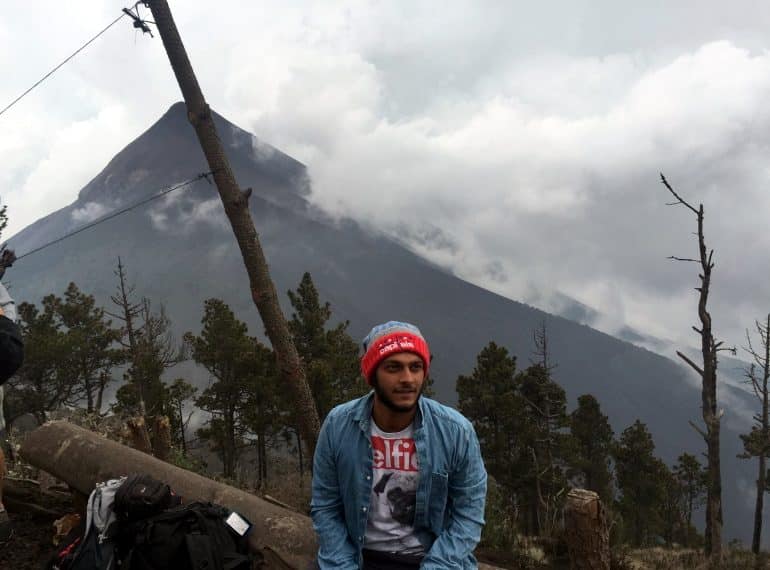
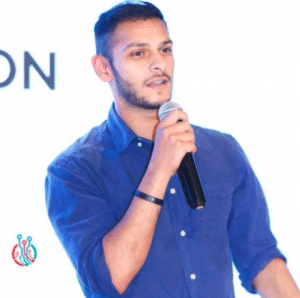 His current professional life as a Business Development Specialist with start-up PowerPay – a company offering Chinese e-payment services to European shops so they can attract high-spending Chinese tourists – is very different from the six years he spent with Deutsche Bank.
His current professional life as a Business Development Specialist with start-up PowerPay – a company offering Chinese e-payment services to European shops so they can attract high-spending Chinese tourists – is very different from the six years he spent with Deutsche Bank.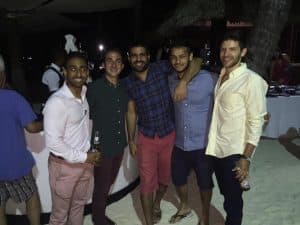 In his spare time, Anand has completed a number of solo trips across Central and South America – “a huge eye opener and character-builder, which definitely helped me with my move to Shanghai” –and is keen to visit more countries once the pandemic has subsided, including South Africa and Australia.
In his spare time, Anand has completed a number of solo trips across Central and South America – “a huge eye opener and character-builder, which definitely helped me with my move to Shanghai” –and is keen to visit more countries once the pandemic has subsided, including South Africa and Australia.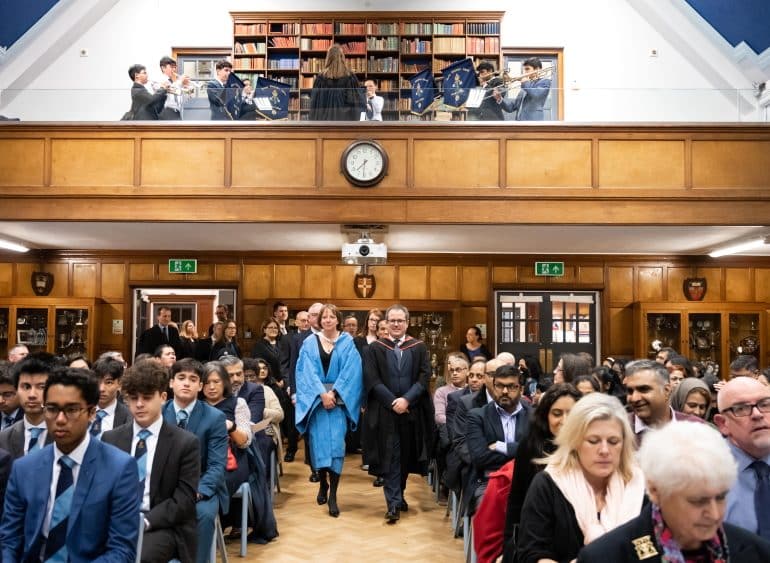
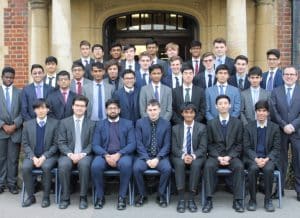 One undoubted highlight of this term was the news that 40 boys have been offered Oxbridge places. This is a new record for QE and represents a very considerable achievement, for the boys individually and for the School. Twenty-seven places are for Cambridge, the remaining 13 for Oxford.
One undoubted highlight of this term was the news that 40 boys have been offered Oxbridge places. This is a new record for QE and represents a very considerable achievement, for the boys individually and for the School. Twenty-seven places are for Cambridge, the remaining 13 for Oxford.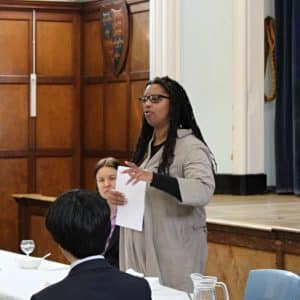 Oxbridge offers should certainly be celebrated, and there has been great news for others, too, with many boys holding offers for courses such as Medicine and Dentistry, for example. There are interesting opportunities overseas, with 12 boys applying to US universities and one to Japan; one pupil has been awarded a $180,000 scholarship to study at the University of Toronto, based on academic merit – our first-ever offer from a Canadian university, as far as I am aware. Applications have been made across disciplines including Arabic, Classics, Criminology, Music, and Optometry, alongside subjects more commonly chosen by our boys.
Oxbridge offers should certainly be celebrated, and there has been great news for others, too, with many boys holding offers for courses such as Medicine and Dentistry, for example. There are interesting opportunities overseas, with 12 boys applying to US universities and one to Japan; one pupil has been awarded a $180,000 scholarship to study at the University of Toronto, based on academic merit – our first-ever offer from a Canadian university, as far as I am aware. Applications have been made across disciplines including Arabic, Classics, Criminology, Music, and Optometry, alongside subjects more commonly chosen by our boys.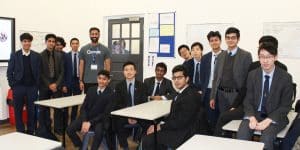 Old Elizabethan help made a significant contribution to this year’s Oxbridge successes. Indeed, alumni now consistently play an important role in our senior boys achieving the best outcomes, lending their support through initiatives such as our USP (Universities Support Programme) and the inaugural Mock Interview Evening. Lectures and talks given by our alumni are also important in this regard: this term has seen Google manager Nikolai Donko (OE 2000-2007) enthusiastically championing ‘tech’ careers to the Upper School, McKinsey Business Analyst Kiran Modi (OE 2007-2014) speaking to our aspiring economists, and Jordan Wan (OE 2004–2011) sharing with Year 9 boys insights into his work as an NHS Clinical Scientist Trainee. And when, during the winter, QE teams won two of the four main prizes (including the overall first prize) in the Institution of Civil Engineers’ #ICanEngineer competition in our first year of entry, another old boy, Karan Dewnani (OE 2006-2013) was on hand to greet them in the offices of engineering firm, Jacobs. Karan works for Jacobs as a Civil Engineer in the rail industry and, as a STEM Ambassador, was supporting the competition organisers on the day.
Old Elizabethan help made a significant contribution to this year’s Oxbridge successes. Indeed, alumni now consistently play an important role in our senior boys achieving the best outcomes, lending their support through initiatives such as our USP (Universities Support Programme) and the inaugural Mock Interview Evening. Lectures and talks given by our alumni are also important in this regard: this term has seen Google manager Nikolai Donko (OE 2000-2007) enthusiastically championing ‘tech’ careers to the Upper School, McKinsey Business Analyst Kiran Modi (OE 2007-2014) speaking to our aspiring economists, and Jordan Wan (OE 2004–2011) sharing with Year 9 boys insights into his work as an NHS Clinical Scientist Trainee. And when, during the winter, QE teams won two of the four main prizes (including the overall first prize) in the Institution of Civil Engineers’ #ICanEngineer competition in our first year of entry, another old boy, Karan Dewnani (OE 2006-2013) was on hand to greet them in the offices of engineering firm, Jacobs. Karan works for Jacobs as a Civil Engineer in the rail industry and, as a STEM Ambassador, was supporting the competition organisers on the day.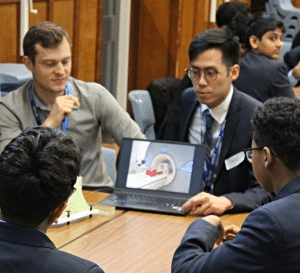 Very importantly, as I made clear in my speech at Senior Awards, the successes achieved by our senior boys are also the result of our emphasis on free-thinking scholarship throughout the entire School. Our focus is on the fundamental attributes that underpin scholarship, which include the nurturing of intellectual exploration beyond the bounds of the examination syllabus. We are open to expressions of scholarship which come in different guises and are inspired by different sources, such as the award-winning podcasts of George the Poet (George Mpanga, OE 2002–2009), or the work of another Old Elizabethan poet, Anthony Anaxagorou (1994–1999). We recognise that scholarship involves creativity (in the sciences as well as the arts), and that it can be emotional as well as empirical.
Very importantly, as I made clear in my speech at Senior Awards, the successes achieved by our senior boys are also the result of our emphasis on free-thinking scholarship throughout the entire School. Our focus is on the fundamental attributes that underpin scholarship, which include the nurturing of intellectual exploration beyond the bounds of the examination syllabus. We are open to expressions of scholarship which come in different guises and are inspired by different sources, such as the award-winning podcasts of George the Poet (George Mpanga, OE 2002–2009), or the work of another Old Elizabethan poet, Anthony Anaxagorou (1994–1999). We recognise that scholarship involves creativity (in the sciences as well as the arts), and that it can be emotional as well as empirical. We are highly committed to excellence and to ensuring that it is evident in all the different facets of the School’s life. Our new Music School will be important as a venue for the creative arts and we recognise that the physical environment is a factor in the encouragement of scholarship. Alongside all the other ongoing improvement works taking place here, we are now out to tender for the build phase. We have ‘specced out’ the building, which will include a valuable social space (the atrium), and a recital hall.
We are highly committed to excellence and to ensuring that it is evident in all the different facets of the School’s life. Our new Music School will be important as a venue for the creative arts and we recognise that the physical environment is a factor in the encouragement of scholarship. Alongside all the other ongoing improvement works taking place here, we are now out to tender for the build phase. We have ‘specced out’ the building, which will include a valuable social space (the atrium), and a recital hall.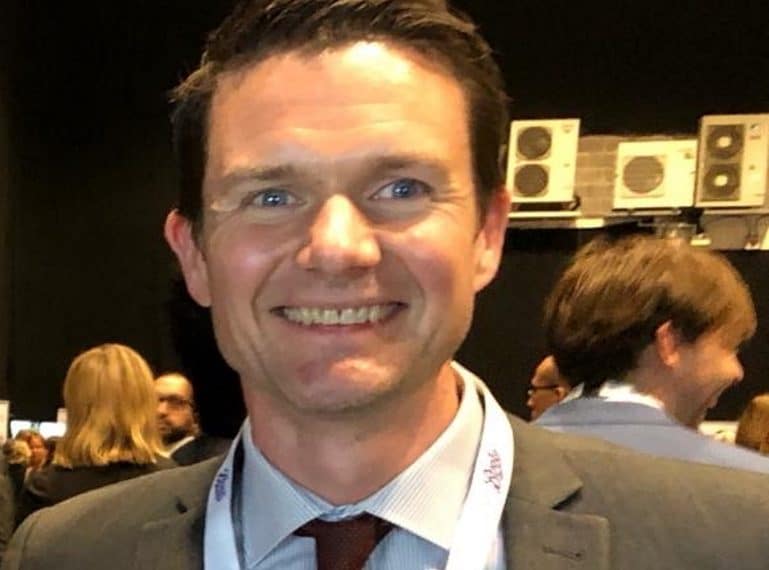
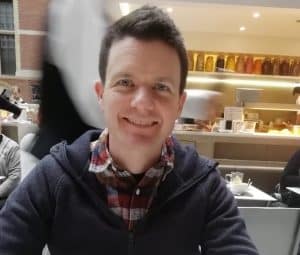 A former School Captain under Eamonn Harris, he cherishes happy memories of his days at QE and highlights the impact his Headmaster had on the School and on him – including giving him a lifelong love of drinking tea!
A former School Captain under Eamonn Harris, he cherishes happy memories of his days at QE and highlights the impact his Headmaster had on the School and on him – including giving him a lifelong love of drinking tea!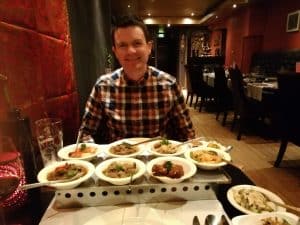 “I was part of Broughton and took part in all the activities that School had to offer, including music (trumpet – unfortunately I don’t play anymore!) and sport, where I loved athletics and playing rugby; I have enjoyed the game ever since. Two sports teachers stand out: Mr [Robert] Relton (who co-incidentally was the Headteacher two years ago for a school my sister taught at in Abu Dhabi!) and Mr [David] Maughan. They were both great teachers in their inimitable way. I always remember the warm-ups – having to do 20 press ups and sit-ups at each corner of the pitch, and if you were too slow running around the pitch, Mr Maughan often repeating: ‘What are you waiting for – a stab in the back?’. That, and of course the infamous cross-country runs and the classic elephant dip that every QE boy will remember!”
“I was part of Broughton and took part in all the activities that School had to offer, including music (trumpet – unfortunately I don’t play anymore!) and sport, where I loved athletics and playing rugby; I have enjoyed the game ever since. Two sports teachers stand out: Mr [Robert] Relton (who co-incidentally was the Headteacher two years ago for a school my sister taught at in Abu Dhabi!) and Mr [David] Maughan. They were both great teachers in their inimitable way. I always remember the warm-ups – having to do 20 press ups and sit-ups at each corner of the pitch, and if you were too slow running around the pitch, Mr Maughan often repeating: ‘What are you waiting for – a stab in the back?’. That, and of course the infamous cross-country runs and the classic elephant dip that every QE boy will remember!”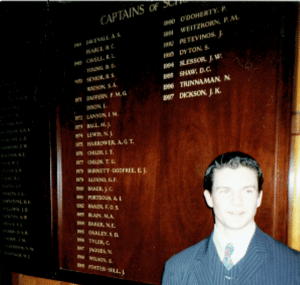 A particularly strong personal memory is of the day he was invited by Eamonn Harris to be the 1996 School Captain. “I remember it for a few reasons. I was nervous, having been summoned to his office unaware of the appointment, and then of course being immensely proud when he asked me to take up the position. But I also remember that he asked me what I wanted to drink when I entered the office, the choice being ‘tea or coffee’. I didn’t drink either, but being too nervous to refuse, or to ask for anything different, I went for what I thought was the lesser of the two dislikes and had tea. From that day, I have drunk it and it has continued to be a favourite ever since! “
A particularly strong personal memory is of the day he was invited by Eamonn Harris to be the 1996 School Captain. “I remember it for a few reasons. I was nervous, having been summoned to his office unaware of the appointment, and then of course being immensely proud when he asked me to take up the position. But I also remember that he asked me what I wanted to drink when I entered the office, the choice being ‘tea or coffee’. I didn’t drink either, but being too nervous to refuse, or to ask for anything different, I went for what I thought was the lesser of the two dislikes and had tea. From that day, I have drunk it and it has continued to be a favourite ever since! “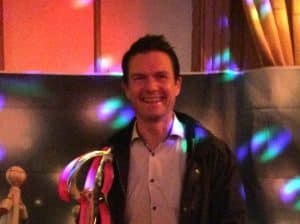 “Outside of work, I have lived in Nottingham since I left university and have been married to Toni, my amazing wife, for nearly 15 years and have two incredible kids, Ralf, 11, and Lois who is nearly nine. We are a tight-knit and loving family and have spent many happy years together, recently extending our house to create a lovely family home. We all love music and holidays, travelling to as many different places as possible. Our favourite has been Italy, although fortunately we haven’t booked a holiday this year, given all that is going on.
“Outside of work, I have lived in Nottingham since I left university and have been married to Toni, my amazing wife, for nearly 15 years and have two incredible kids, Ralf, 11, and Lois who is nearly nine. We are a tight-knit and loving family and have spent many happy years together, recently extending our house to create a lovely family home. We all love music and holidays, travelling to as many different places as possible. Our favourite has been Italy, although fortunately we haven’t booked a holiday this year, given all that is going on.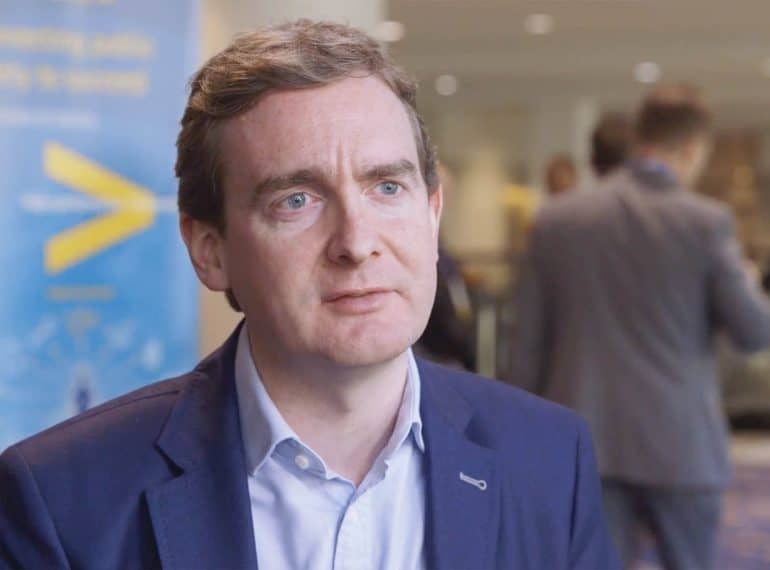
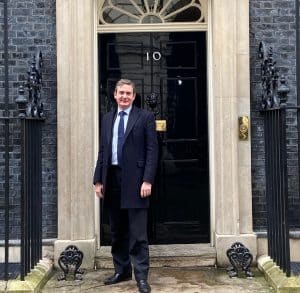 James was at QE from 1988 to 1995 and says his time as a pupil – and especially 1994, when he was School Captain – proved to be a good foundation, giving him leadership, organisational and public-speaking skills that he still uses in his job today.
James was at QE from 1988 to 1995 and says his time as a pupil – and especially 1994, when he was School Captain – proved to be a good foundation, giving him leadership, organisational and public-speaking skills that he still uses in his job today.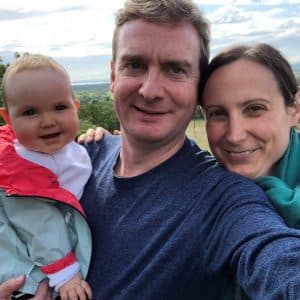 “Overall, I help these organisations enhance operational performance, increase efficiency and deliver improved outcomes to the public. I have worked across strategic consulting engagements such as efficiency and effectiveness reviews, workforce transformations and system requirements analysis, through to stakeholder and programme management on large-scale transformational programmes.
“Overall, I help these organisations enhance operational performance, increase efficiency and deliver improved outcomes to the public. I have worked across strategic consulting engagements such as efficiency and effectiveness reviews, workforce transformations and system requirements analysis, through to stakeholder and programme management on large-scale transformational programmes.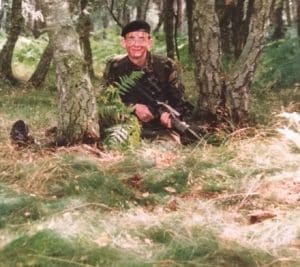 “I also think this is a skill I started to develop at QE in general – and especially during my time a School Captain – where the art of understanding others and developing the power of persuasion were critical.”
“I also think this is a skill I started to develop at QE in general – and especially during my time a School Captain – where the art of understanding others and developing the power of persuasion were critical.” James has written extensively in leading industry publications on a range of policing topics, including the use of social media, police information management, analytics and digital disruption. “The development of thought leadership, looking to the future and what this might mean for public safety is a large part of my role,” he adds.
James has written extensively in leading industry publications on a range of policing topics, including the use of social media, police information management, analytics and digital disruption. “The development of thought leadership, looking to the future and what this might mean for public safety is a large part of my role,” he adds.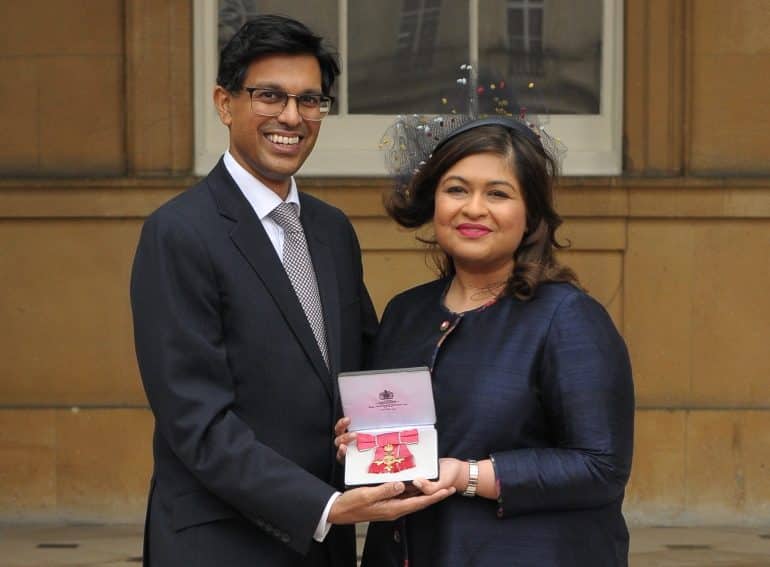
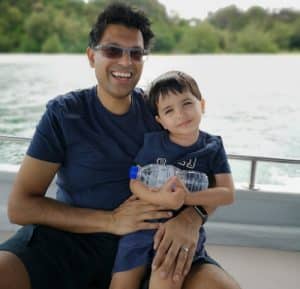 Through all these changes of location, there is one common thread around which he has built his career: insurance. “Whilst most people regard this facet of life as nothing more than an administrative pain, insurance has provided me with a passion where I continuously find a new challenge to keep me on my toes,” he says.
Through all these changes of location, there is one common thread around which he has built his career: insurance. “Whilst most people regard this facet of life as nothing more than an administrative pain, insurance has provided me with a passion where I continuously find a new challenge to keep me on my toes,” he says. Another highlight has been his election as Chair of the Institute and Faculty of Actuaries Cyber Risk Working Party – “a research effort focused on understanding the impact of cyber risk on insurance and on the other industries actuaries are involved in.”
Another highlight has been his election as Chair of the Institute and Faculty of Actuaries Cyber Risk Working Party – “a research effort focused on understanding the impact of cyber risk on insurance and on the other industries actuaries are involved in.”